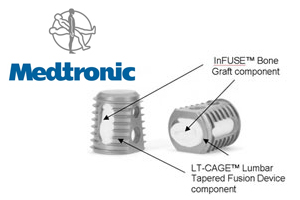
Medtronic (NYSE:MDT) could avoid a major headache if the courts continue to allow the doctrine of preemption in product liability lawsuits filed over its InFuse bone-growth protein, according to Fish & Richardson principal José Sierra.
The InFuse bone growth protein has been on the U.S. market since 2002, when the FDA approved the product for anterior use in the lower spine. Lawsuits have accused Medtronic of illegally marketing the device for use in the neck and in posterior lumbar procedures.
But those suits face an uphill battle if recent cases are anything to go by, Sierra wrote in Lexology.
"A majority of plaintiffs seeking damages based on off-label promotion of Medtronic’s InFuse bone graft system have been stopped in their tracks following several recent federal court decisions holding that such challenges were barred on preemption grounds. Indeed, with the exception of 2 district court cases out of the 9th Circuit, these preemption rulings not only underscore the limits of off-label promotion arguments in medical device cases, but also show that courts remain skeptical about whether off-label promotion is illegal under federal law," he wrote, citing the Caplinger v. Medtronic case in the U.S. District Court for Western Oklahoma in which the judge found that the plaintiff’s off-label claims failed to trump federal preemption.
"Since the plaintiff in Caplinger was really just trying to enforce her interpretation of the FDCA’s rules regarding off-label promotion, the court found that her suit did not establish a parallel violation of state law and, therefore, was subject to preemption and dismissal. Even additional information about Medtronic’s manipulation of clinical trial data related to InFuse did not move the court this past April to reconsider its February ruling or to allow the plaintiff leave to file an amended complaint. Most courts facing similar suits to Caplinger have arrived at the same conclusion," Sierra wrote. "While Caplinger and similar court decisions underscore the limits of using off-label promotion in lawsuits involving PMA-cleared medical devices, what is perhaps far more important for medical device and pharmaceutical manufacturers in other contexts is the utter lack of sympathy some courts have for the premise that off-label promotion is unlawful conduct in the 1st instance."
The upshot is that, "when given the opportunity, judges harbor real doubts that off-label marketing is illegal in the first place," he wrote, citing a decision in the U.S Court of Appeals for the 2nd Circuit that found that "truthful, accurate and non-misleading off-label promotion is constitutionally protected free speech."

